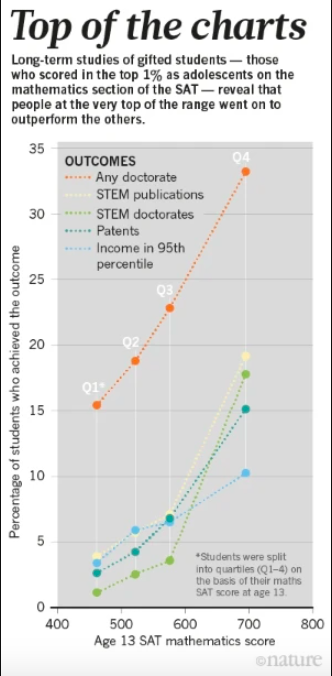Want to raise a child genius? A study running for 45 years has suggestions.

In 1971, professor Julian Stanley founded the Study of Mathematically Precocious Youth (SMPY) program. SMPY is “the longest-running current longitudinal survey of intellectually talented children,” Nature reports. For the last 45 years it’s tracked the accomplishments of over 5,000 gifted children – and they’ve shaped our world.
“Whether we like it or not, these people really do control our society,” Jonathan Wai, a psychologist at the Duke University Talent Identification Program in Durham, North Carolina, said to Nature. “The kids who test in the top 1% tend to become our eminent scientists and academics, our Fortune 500 CEOs and federal judges, senators and billionaires.”
That’s no exaggeration:

Children who excel at the math portion of the Scholastic Aptitude Test (SAT) are few and far between. They aren’t just good at math; they have outstanding analytical reasoning skills, meaning they know how to identify, breakdown, and solve problems – not just do math. Psychologist Daniel Keating of Johns Hopkins University explains the results to Nature: “The first big surprise was how many adolescents could figure out math problems that they hadn’t encountered in their course work. The second surprise was how many of these young kids scored well above the admissions cut-off for many elite universities.”
One other thing gifted children excel at is spatial ability, or pattern thinking. Spatial ability is a litmus test for creativity and innovation, as Stanley’s next SMPY cohort would go on to prove. “I think it may be the largest known untapped source of human potential,” psychologist David Lubinski of Vanderbilt told Nature. “Students who are only marginally impressive in mathematics or verbal ability but high in spatial ability often make exceptional engineers, architects and surgeons. And yet, no admissions directors I know of are looking at this, and it’s generally overlooked in school-based assessments.”
So how do we encourage all these future world leaders? Truthfully, most gifted children are left to fend for themselves within the confines of the American educational system. With programs like No Child Left Behind and the Common Core curriculum, the focus of American education for the last few decades has been on helping struggling students catch up. The students who aren’t struggling are overlooked within that system, and that leaves any hope of acceleration to their parents.
To their credit, parents often recognize this. To their detriment, most parents see signs of genius and try to mold their child into one without stopping to realize whether or not their child actually is one. That attitude is detrimental – to all children, not just gifted ones. Psychologist Alison Gopnik explains:
As an alternative, SMPY recommends that children who show advanced aptitude in analytical reasoning and spatial skills be allowed to take Advanced Placement courses, college courses, and even skip grades, according to Nature. As Lubinksi put it, “these kids don’t need anything special… they just need earlier access to what’s already available to older kids.” Here are some other tips he offered, quoted from Nature:
- Expose children to diverse experiences.
- When a child exhibits strong interests or talents, provide opportunities to develop them.
- Support both intellectual and emotional needs.
- Help children to develop a ‘growth mindset’ by praising effort, not ability.
- Encourage children to take intellectual risks and to be open to failures that help them learn.
- Beware of labels: being identified as gifted can be an emotional burden.
- Work with teachers to meet your child’s needs. Smart students often need more challenging material, extra support or the freedom to learn at their own pace.
- Have your child’s abilities tested. This can support a parent’s arguments for more-advanced work, and can reveal issues such as dyslexia, attention-deficit/hyperactivity disorder, or social and emotional challenges.
Basically, gifted children march to the beat of their own drums. Let them. They’ll be okay.





